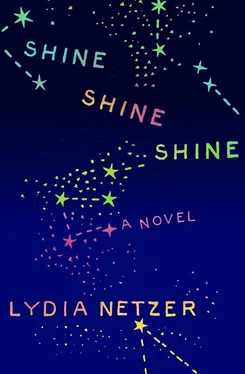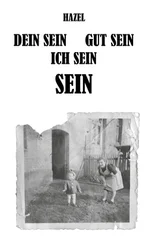The type of women that frequented the neighborhood craft show were not the type that needed extra money for Christmas. They were there playing store. They were also there for the mimosas. There was a delicately lettered sign festooned with streamers and balloons, set up on an A-frame in Jenny’s perfect yard. But if any stranger had wandered in off the street, no one would have known what to do about it.
Jenny had brought every portable surface in the house to the fore in her modern Tudor palace, little side tables carrying felted catnip balls, the dining-room table hidden under an assortment of quilted handbags and hats. Ladies of the neighborhood floated around through the front rooms: the foyer with its grand staircase, the den with its grand fireplace, the dining room with its grand mural, a Welsh countryside painted on the wall next to the French table beside the German windowpanes. Jenny was no gifted designer, but her husband had a bank account without a bottom. With adultery and divorce beating their wings in the air, she was not moved to conserve his cash.
As soon as Sunny’s foot touched the beautiful planks of Jenny’s foyer, her body knew just what to do. She drifted into the kitchen, complimented the renovations, set down her platter, and chose a perfect slicing knife from Jenny’s silverware drawer.
“What is it, Sunny?” asked Jenny sweetly. She was putting on a brave face. The husband was in the dining room, wearing a tweed jacket and a leather golf cap, his long white hair pulled back in a horrible little ponytail. He had piercing black eyes and a nervous mouth. But Jenny was keeping her distance. With her friends around her, she would carry on.
“It’s braided honey loaf,” Rache interjected. “Norwegian, you know.”
“Dutch,” said Sunny.
“Oh, neat! I want to try some … later.” Jenny moved off gracefully to praise Angela’s mother’s handbags.
Sunny stood there at the sideboard, looking around the gleaming heads and smooth shoulders of her neighbors. They were good people, and smart people. She did not feel, without her wig, that she was suddenly better than them, that they did not deserve her. Instead, the opposite. Here they were, unsuspiciously they had brought her into their fold, let her rise to the top of their pecking order, had listened to her advice, had followed her lead, and now she had betrayed them. She could feel them avoiding her gaze when she faced them, but felt their eyes on her behind her back. In some ways, she was invisible, but in some ways, they couldn’t take their eyes off her.
Then a strong knock sounded on the door, and it flew open, revealing a familiar figure in the doorway, bold and sure. Les Weathers entered the room. The women went to him like butterflies. They offered to take his jacket, they led him to the food table, pressed a plate into his hand, a fork. Their voices lilted up an octave. Suddenly Jenny’s husband, who had been telling a story of how he got beat up half a block from home, walking to a party at the Hardisons’ last New Year’s Eve, was abandoned. They had all heard that story anyway. Here was Les Weathers of Channel 10 News. He greeted them, flashing his white teeth, patting shoulders and nodding, but then Les Weathers made a tall, blond beeline for Sunny.
He took her by the elbow, bent his head toward her in concern, and said, “Sunny, are you all right? How’s the baby? Hanging in there?”
“We’re okay,” said Sunny.
“Oh, good,” said Les Weathers. “I’m glad to see you out and about, taking in the nice fall air.”
“Yes, well,” said Sunny, “I need to go soon. To the hospital.”
“What’s wrong?” he gasped, instantly renewing his posture of concern. “More contractions?”
“No, it’s my mother.”
Les Weathers furrowed his brow and the few ladies around Sunny said “aww” and “ooh” sympathetically. They knew about the mother, how she had been retrieved from Pennsylvania in an advanced state of death, and how she had been lingering at the hospital.
“How is she, Sunny?” asked Rache. “Is she conscious? Did she say something?”
“Oh, I took her off life support,” said Sunny. “She’s dying. She’s going to die now.”
When she said these things, she felt her rib cage weaken. In her mind, she saw the slice of muffin she had been holding fall out of her hand. Someone dove for it, scooped it into a napkin, disappeared it. She imagined Les Weathers’s strong, broad arm around her, and she almost felt herself leaning into his starched shirtfront, his sternum smelling briskly of lime and confidence. She wanted to cry and scream and wail, there in front of everyone, her face twisted up and red, her hands clawing apart his hairdo, pulling his ears off. But these things didn’t happen. The muffin stayed in her hand. The box of feelings she had packed in the hospital room remained packed, and nothing escaped it.
“It’s okay, it’s okay,” Les Weathers, more to the gathering of women than to Sunny.
“She’s okay. She’s had a rough time. But she’s dealing with it. Look.”
“I feel bad,” Sunny said, and coughed a little bit. She saw herself, as if from across the room, keeping it together, mouth solid like a line across her face. How much she longed to scream it out at them: I FEEL BAD! I FEEL BAD THAT I PULLED THE PLUG ON MY MOTHER! I KILLED HER AND I FEEL BAD! SHE IS GOING TO DIE! But she would not. She would not be something that would be remembered for years, something people would tell their husbands about later, tell their sisters about on the phone. No, they would not talk about some wrinkled tearing thing clinging to the big man with the ironed curls of hair and the cleft chin, squeaking and spouting. They would report, instead, the smooth alien in the peasant top, saying calmly, “I do feel bad that I pulled the plug on her.”
“Sunny, you must have had to!” Rache put in, and Jenny put one hand on Sunny’s back. “You had to let her go, and it was time! You did the right thing.”
How could it be the right thing to kill something that’s alive? How could Rache know anything, when Sunny had been lying to her from the start? But she put that thought in the box, and she closed the box. And the screaming, and the tearing at herself, and the crawling under her bed to wait for death, all was packed into the box, and the box was shut, and taped shut, and she would not open the box, or think about the box.
“She was alive, and now she’s going to die, and it’s my fault. I did it,” she said.
“Ridiculous,” thundered Les Weathers. With one hand wrapped tightly around Sunny, he picked up a chocolate-chip scone in the other and gesticulated definitively before putting it into his mouth with a flourish. “You’re not some criminal. You don’t go around killing people. You’re just a woman. A bald woman. And you just do what you have to do.”
Chewing the scone, he warmed to his topic. “We all do hard things, Sunny. Losing my wife Teresa was the hardest thing I’ve ever done. But it had to happen. Did I abandon her? No, she ran away from me. Did you kill your mother? No. Through your inaction you allowed her to die. But everyone told you to do it. The court, the doctor, even your own husband. You did the right thing. It was for the best.”
In the winter of the year when Sunny was eight years old, Maxon was nine. She and her mother wanted to take Maxon skiing but his father said no. They were going to go skiing, wrapping up in parkas and snow pants, fuzzy hats, goggles, scarves, until no one could distinguish Sunny from a regular child with a regular head all full of glossy ringlets or straight layers. Maxon, they felt sure, would benefit from going skiing. From getting out of the valley. They all would. They were going to drive to Vermont. But his father said no.
Читать дальше









